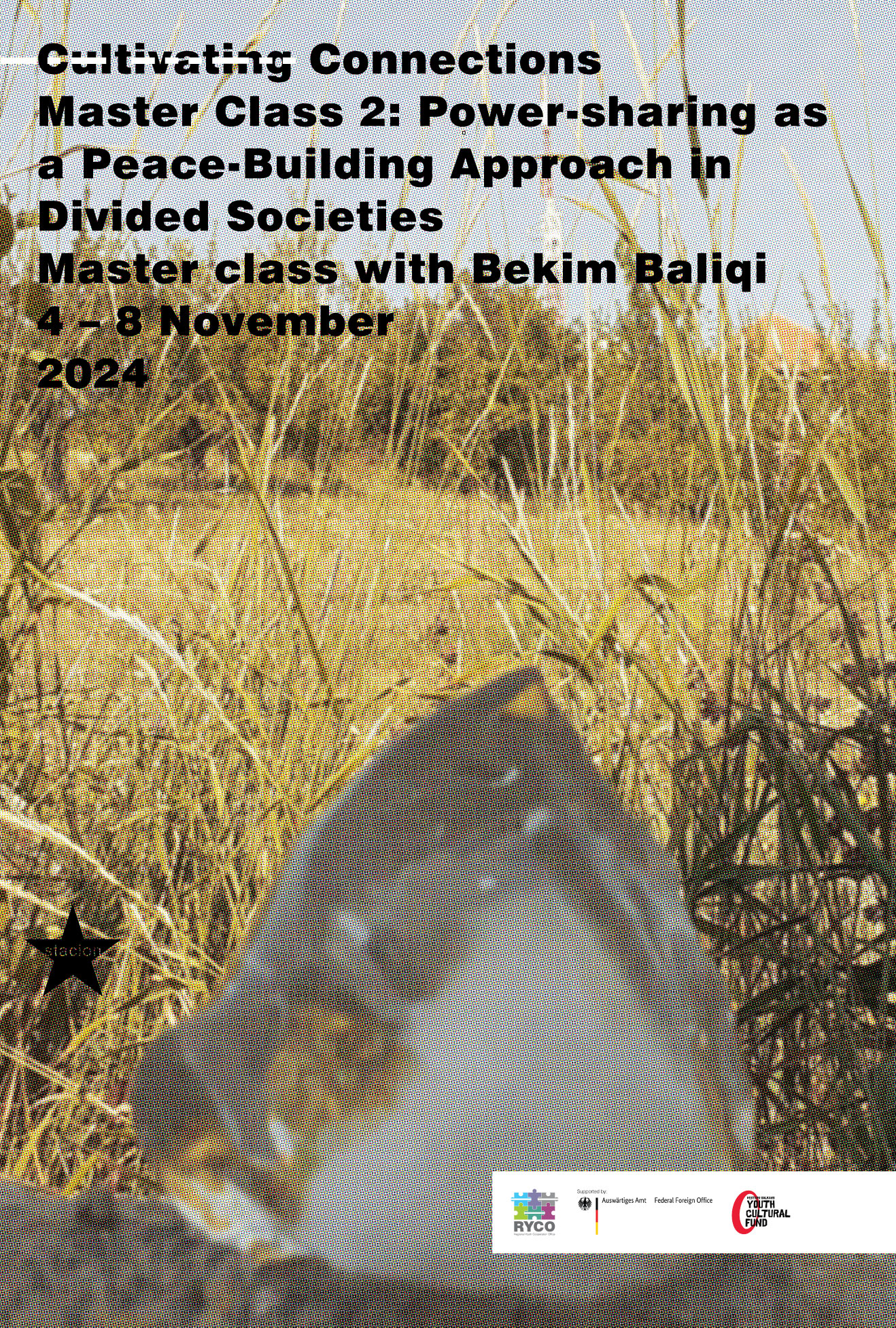
Cultivating Connections
Master Class 2: Power-sharing as a Peace-Building Approach in Divided Societies
Master Class by Prof Bekim Baliqi
Prishtina, 4 – 8 November 2024, from 18:00 to 21:00
Venue: Hivzi Sylejmani Library, Tophane, rr. UÇK 27-1, Prishtina, Kosovo
In-person participation
The deadline for registration 30 October 2024
Description
Power-sharing, also known as consociationalism or consociational democracy, is an increasingly popular approach for solving conflicts and promoting ethnic diversity in post-war and divided societies. This model involves the implementation of institutional provisions and constitutional principles that ensure the representation and participation of all major ethnic or other groups in state institutions and decision-making processes.
The power-sharing model aims to establish a democratic framework that accommodates non-majority communities by emphasizing consensus and inclusion among different groups. It has been widely implemented in various multi-ethnic and post-conflict states, such as Lebanon, Northern Ireland, Bosnia and Herzegovina, North Macedonia, and Kosovo. This model of democracy emphasizes elite cooperation among ethnic groups and institutional engineering through the creation of stable multi-ethnic coalition governments and other power-sharing institutions, thereby fostering a political culture of consensus. However, it is important to consider whether consociationalism effectively increases democratic participation and representation for all citizens, and to what extent this contributes to the legitimacy of the state as the foundation for political unity. There are numerous critics and cases that disapprove the effectivity of this approach.
The master class will provide an overview of key concepts related to consociational democracy in post-conflict societies. It will also include a literature review on the issue of shared identity, using several case studies as examples.
While consociational democracy aims to foster interethnic trust through cooperation, little attention is given to the topic of identity. To evaluate the effectiveness and applicability of power-sharing arrangements in state consolidation and interethnic relations, we will examine the experiences of Western Balkan states, with a particular focus on Kosovo. The course will thoroughly analyze and debate the four major characteristics of consociational democracy within the institutional, constitutional, and political systems of the selected case studies.
Furthermore, this master class will discuss also different approaches and models withing consocional democracy, such as corporate and liberal type of consocionalism.
Intended Learning Outcomes
By completing this master class, students will achieve the following:
- To gain a better understanding of the notions of ethnicity, civic identity and power-sharing as well as the role that they have in divided society, culture and politics;
- Reflecting on the interdependence of political, legal, and institutional power and how they shape our perception of the "other" and our own identity.
- Exploring the factors that contribute to the construction of a multi-ethnic society and/or civic identity.
- Assessing and reflecting on power-sharing models and their contributions to peacebuilding, democratization, and stability in post-conflict societies.
Biography
Bekim Baliqi has studied Political Science (Mag.Phil.) in 2005 and has completed Doctoral studies (Dr.phil) at the Institute of Political Science in 2008, at the University of Vienna. Since 2009, he is Professor at the Department of Political Science, University of Prishtina. His main research interests are in; nationalism, ethnic conflicts, peace studies and democratization in post-conflict societies. He has participated in a number of scientific international symposiums, research projects and has published several books, bookchpaters and research articles. He is fluent in English, German, Serbian and understands Turkish.
Participation
15 participants will be selected to participate in this master class. To register and participate in the program's master classes, interested participants must send the following documents in English by email: 1. CV, 2. letter of motivation, 3. scholarship application, sent to the official email address application@stacion.org
The deadline for registration is 30 October 2024
The language of instruction is English.
The program offers scholarships that will cover tuition fees, travel and visa costs for five selected participants from Western Balkans 6 (WB6): Albania, Bosnia and Herzegovina, Kosovo*, Montenegro, North Macedonia, and Serbia. Special conditions apply for alumni of the Summer School as School. Recommended Readings and the complete Master Class syllabus will be provided to registered participants.
Cultivating Connections: Empowering Youth through Intercultural Learning on Power-Sharing, Art and Memory and Cultural Conflict in Public Sphere is a project by Stacion – Center for Contemporary Art Prishtina in partnership with Rex Cultural Centre, Belgrade, supported by RYCO/ Regional Youth Cooperation Office and the Municipality of Prishtina.